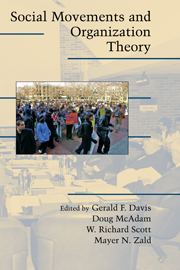Book contents
- Frontmatter
- Contents
- Contributors
- Preface
- I Creating a Common Framework
- II Political and Mobilization Context
- III Social Movement Organizations: Form and Structure
- IV Movements Penetrating Organizations
- V Conclusion
- 12 SOCIAL CHANGE, SOCIAL THEORY, AND THE CONVERGENCE OF MOVEMENTS AND ORGANIZATIONS
- 13 TWO KINDS OF STUFF: THE CURRENT ENCOUNTER OF SOCIAL MOVEMENTS AND ORGANIZATIONS
- References
- Author Index
- Subject Index
13 - TWO KINDS OF STUFF: THE CURRENT ENCOUNTER OF SOCIAL MOVEMENTS AND ORGANIZATIONS
Published online by Cambridge University Press: 05 September 2012
- Frontmatter
- Contents
- Contributors
- Preface
- I Creating a Common Framework
- II Political and Mobilization Context
- III Social Movement Organizations: Form and Structure
- IV Movements Penetrating Organizations
- V Conclusion
- 12 SOCIAL CHANGE, SOCIAL THEORY, AND THE CONVERGENCE OF MOVEMENTS AND ORGANIZATIONS
- 13 TWO KINDS OF STUFF: THE CURRENT ENCOUNTER OF SOCIAL MOVEMENTS AND ORGANIZATIONS
- References
- Author Index
- Subject Index
Summary
The warning comes from Leviticus: “You shall keep my statutes. You shall not let your cattle breed with a different kind; you shall not sow your field with two kinds of seed; nor shall there come upon you a garment of cloth made of two kinds of stuff” (cited in Douglas 1966: 53). Given these commandments, one might suspect that it is also dangerous to mix literatures of different kinds. When tie-dyed activists and poor people's marches are central to the imagery of a theory, can that theory be transposed to corporate boardrooms and back offices without doing fundamental violence to our understanding of both phenomena? When formal authority and control over resources infuse the theoretical imagination of one literature, can that body of work truly inform the analysis of resistance to authority?
As befits a volume informed by studies of protest, the contributors ignore authority and break commandments. Yet there are signs that these literatures do not mesh seamlessly. Tensions appear at the margins of arguments; hybrid models suggest possibilities of innovation but also of problematic mutations or simply sterility. Viewed in a longer perspective, however, the current effort at cross-fertilization is only the most recent in a series of encounters between two sociological lineages that seem to both attract and repel one another. Each successive encounter has been fueled by distinctive concerns and offers diverging opportunities (or obstacles) to a more fruitful engagement.
- Type
- Chapter
- Information
- Social Movements and Organization Theory , pp. 351 - 366Publisher: Cambridge University PressPrint publication year: 2005
- 43
- Cited by



